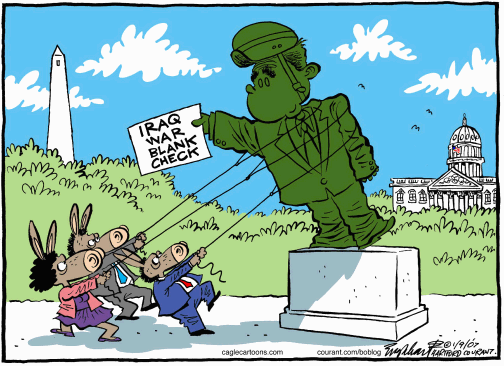 By MARSHA MERCER Media General News Service January 15, 2007
He should have addressed that plea to the Iraqis. The president's new war strategy makes the United States more dependent than ever on the Iraqis to help us get out of Iraq. The president's plan to send about 21,000 more troops into Iraq to fight alongside Iraqi military units against insurgents means Americans will be relying on the al-Maliki government and the Iraqi military in new ways.  Artist Bob Englehart, The Hartford Courant Distributed to subscribers by Cagle Cartoons, Inc.
What makes these "clear and secure" exercises more likely to succeed than previous ones, Bush said, is that Prime Minister Nouri al-Maliki now says political and sectarian interference won't be tolerated. As they say in the financial world, past performance is no indication of the future. In this case, the past is discouraging. Just two months ago, Stephen Hadley, Bush's national security adviser, cast grave doubt on Maliki's ability and resolve. In a classified memo published by The New York Times, Hadley wrote that Maliki's "intentions seem good when he talks with Americans . . . But the reality of the streets of Baghdad suggests Maliki is either ignorant of what is going on, misrepresenting his intentions or that his capabilities are not yet sufficient to turn his good intentions into action." That's not exactly a guy you want watching your back. One wonders if Maliki and his Shiite-dominated government will allow troops to pursue insurgents in Shiite neighborhoods, share oil revenues with Sunnis and Kurds and make good on other moves toward reconciliation. They've been promising such things for months. The president has put the Iraqis on notice that American patience is limited. Some would say it has expired. The U.S. commitment is no longer "open-ended," he stressed, although there's no timetable for withdrawal. Do the Iraqis really intend to pull their country together or let it slip deeper into civil war? News reports quote Sunnis and Kurds as skeptical that the American troop buildup will work or that Maliki will stop violence by Shiites. The New York Times reported last week that while Maliki has not publicly opposed the troop buildup, his aides have. The Maliki government has agreed to spend $10 billion of Iraqi money on reconstruction. This would be a start. Sir Robert Thompson, who developed the British counterinsurgency doctrine that was used to good effect in Malaya in the 1950s, believed the best plan to fight insurgents was 20 percent military and 80 percent political. Thompson wrote, "What the peasant wants to know is: Does the government mean to win the war? Because if not, he will have to support the insurgent." Bush warned that things will get worse in Iraq before they get better. His sober assessment that "the terrorists and insurgents in Iraq are without conscience, and they will make the year ahead bloody and violent" was the last thing members of Congress wanted to hear. The new Democratic majority believes it must show it heard the voters last November demanding a new course in Iraq, but options for war critics are hardly better than Bush's in Iraq. A few members of Congress talk about a vote to cut off funds for the troop surge. But nobody wants to harm the troops already in the field. Instead, showboat Sense of Congress resolutions condemning the president's plan would give members talk time and put them on the record. The president's strategy is a success in one area. He is the "uniter not a divider" he promised to be. Some critics say 21,000 troops are too few and some say 21,000 are too many. But nobody thinks 21,000 are just right.
E-mail mmercer(at)mediageneral.com Distributed to subscribers for publication by Scripps Howard News Service, http://www.shns.com
|